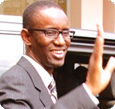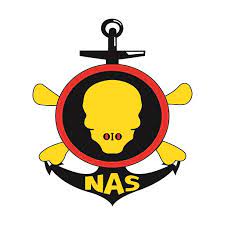The string finally snapped yesterday when the police authorities decided on a new posting for the chairman of the Economic and Financial Crimes Commission, Mr. Nuhu Ribadu. He is shifting from the commission to acquire more knowledge in preparation for higher police duties. This is the official explanation.
His rise and many battles
By Abraham Ogbodo
It is yet unclear who is stepping into the commission to continue from where Ribadu is stopping.
The public interpretation of the unfolding drama in Abuja will surely be different. People will say Ribadu who has been trying to make corruption in public places a bit unattractive has been cut short so that business can continue as usual. In the matter and indeed every other matter in Nigeria, public opinion counts very little. This is why Ribadu will still be helpless even if 140 million Nigerians mobilise for his reinstatement.
There may be something that the tough cop has done that has not been raked to the fore. In the days ahead, there may be good information to inform better judgement. In the main, the gadfly called Ribadu has been handed a final solution. He may be going home fulfilled having fought a good fight.
Under former President Obasanjo Ribadu was in control of all the variables. His methods included arm-twisting the state legislatures into initiating impeachment proceedings against targetted governors. The first to go down with that approach was the self-styled ex-governor general of the Ijaw nation, Diepreye Solomon Peter Alamieyeseigha. The next moment after he had been impeached Alamieyesiegha was the guest of the EFFC. Joshua Dariye of Plateau State and Ayo Fayose of Ekiti State followed.
Like most revolutionaries, Ribadu failed to appreciate early enough when danger outweighed hope. He did not take time off to study the character of the new occupant of Aso Rock. He carried on as if nothing had happened. Even when the new anthem in the presidency called "Due process' attained a crescendo with the Federal Attorney General Michael Aondooaka as the chief choir master. Ribadu feigned deafness.
He went for the tribe of ex-governors and got a handful into the EFFC's dragnet. They were Chimaroke Nnamani, now a sitting senator of the Federal Republic of Nigeria, Joshua Dariye, Saminu Turaki, Orji Kalu and Jolly Nyame. The new man, Umaru Musa Yar'Adua, himself an ex-governor, never stopped talking through the AGF that while he would not tolerate corruption, due process must be followed.
To Ribadu, due process meant a known thief could go to the court, source an ex-parte order restraining the EFCC from arresting him and parade the streets as a super star. Lawyers including Mr. Olisa Agbakoba Nigerian Bar Association (NBA) chairman and Wole Olanipekun, former NBA chairman, however, spoke glowingly in defence of due process.
In the circumstance, it has appeared that only Ribadu, who is also a lawyer, did not understand due process. Later, when he raised another alarm against another ex-governor, James Onanefe Ibori of Delta State, he came in direct collision with the AGF, Aondooaka, who spoke more like a lawyer on the defence team of Ibori who was standing trial in the United Kingdom on charges of money laundering.
Nothing that Ribadu said on the Ibori matter stuck. Aondooka wrote Ibori lawyers in London that their clients was a clean man back home, suggesting in effect that the N30 million or so worldwide assets of Ibori frozen by British court must have been stolen from somewhere other than Nigeria.
He wrote a second letter to the British authorities stating that he could not be compelled to cooperate with prosecutors in London in the trial of Ibori because back home no money was missing from the Delta State treasury from where Ibori was alleged to have looted his frozen money.
Frustrated, Ribadu decided to charge the case before the court of public opinion. He said: "I will leave it to Nigerians to consider. I know that history will tell. The only people I am worried about are young Nigerians working with the EFCC. I don't know what they are going through now."
On another forum, his frustration was even more palpable. Said he: "When you fight corruption, it fights back. Eight EFCC staff have been murdered. We just don't want to be talking about it. I have been maligned and condemned, but it is our country and I think it is worth dying for."
When Ribadu returned to the Ibori case, he was decisive. The EFCC traced Ibori to the Kwara State Liaison Office, Abuja and picked him up. Next day, he was arraigned in a Kaduna Federal High Court on 29-count charge of corruption. Justice Mohammed Shaibu declined bail for the former governor and ordered that he be remanded in prison custody till January 11, 2008.
By Ribadu's own admission, corruption fights back when one fights it. Perhaps it is now his turn to go defensive as corruption seems on the offensive.
Although Ribadu is an Assistance Inspector General of Police, the EFCC Act of 2004 configured the commission to operate outside the police command structure. Section 3(2) of the Act specifically states that the chairman can only be removed by the President for under-performance or issues that border on permanent disability and mental incapacitation.
If the EFCC were under the police command structure, it would have been perhaps difficult for the commission to move against former police Inspector-General, Tafa Balogun. The former IG was forced out in January 2005. He was arrested in March and immediately put on trial on charges of corruption. He was convicted and sentenced to six months in prison.
Before his appointment as chairman of the EFCC in 2003. Ribadu was a chief superintendent of police (SP). He was shot to the rank of a commissioner doing only short periods on the ranks of assistant and deputy commissioner of police.
His initial four-year tenure expired this year but his stay was renewed for another four by former President Olusegun Obasanjo. He was also promoted to the rank of Assistant Inspector-General of Police. His renewed tenure expires on April 8, 2011.
Nuhu Ribadu was born on November 11, 1960. He studied law at the Ahmadu Bello University Zaria between 1980 and 1983 and was called to the Nigerian bar in 1984. He went back to the same university to earn a Master of Law degree. He had served as head of the legal and prosecution department of the Nigeria Police before moving to the EFCC.
As Ribadu leaves the commission, there will be victory songs in some quarters. One of the strong arguments against the EFCC is that under Obasanjo it completely strayed out of the path of duty into the field of with-hunting. Whoever stood in the way of Obasanjo, especially in the turbulent days of the third term project, was marked for liquidation by the EFCC.
In the fight between Obasanjo and his ex-deputy, Atiku Abubakar, the EFCC was the weapons of mass destruction (WMD) against the ex-VP. The commission was unleashed on whoever was linked to Abubakar.
It is also believed that some of the governors who had it rough in the 2003-2007 dispensation suffered because of their political leanings. This is why it will not be wailing all the way.
For now, the focus will shift to who will come to wear the shoes of Ribadu at the EFCC.
By Abraham Ogbodo
The Guardian
Friday, December 28, 2007




